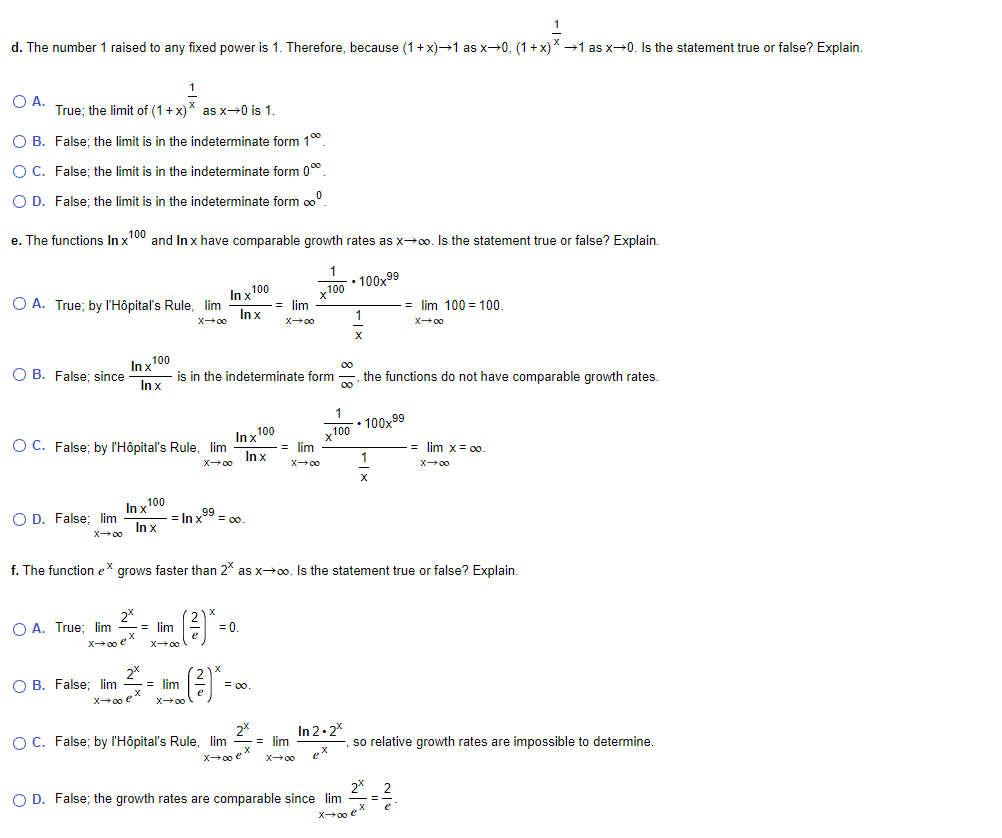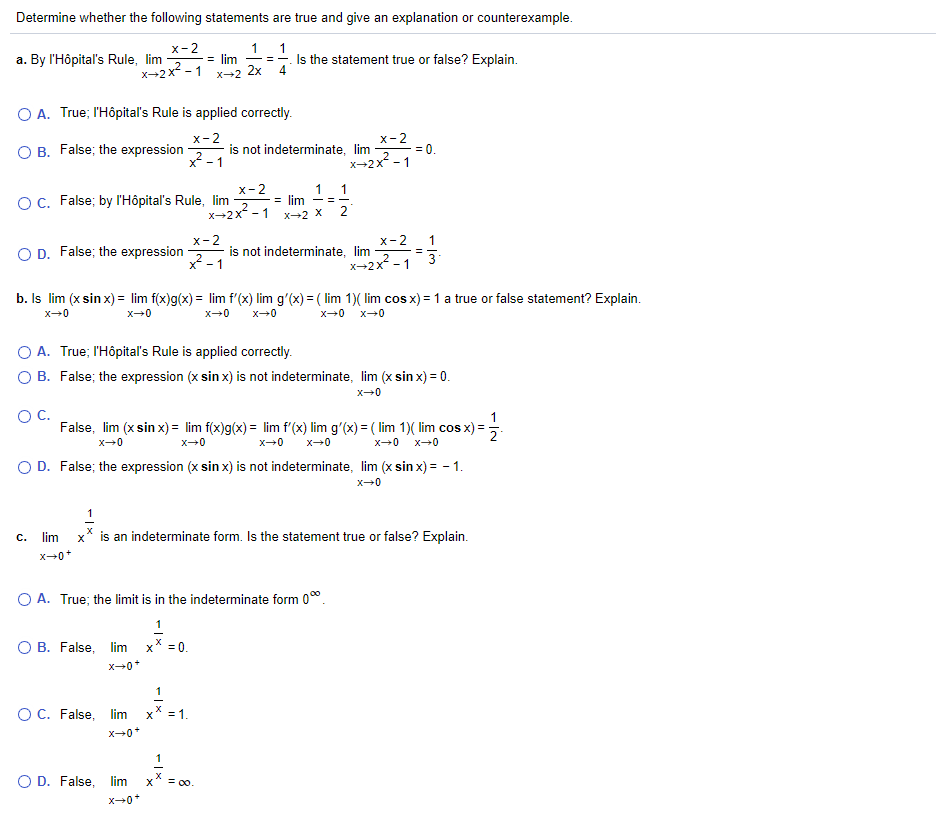d. The number 1 raised to any fixed power is 1. Therefore, because (1+ x)→1 as x→0, (1 + x) * →1 as x→0. Is the statement true or false? Explain. O A. True; the limit of (1+ x)* as x→0 is 1. O B. False; the limit is in the indeterminate form 10. OC. False; the limit is in the indeterminate form 00. O D. False; the limit is in the indeterminate form o0.
d. The number 1 raised to any fixed power is 1. Therefore, because (1+ x)→1 as x→0, (1 + x) * →1 as x→0. Is the statement true or false? Explain. O A. True; the limit of (1+ x)* as x→0 is 1. O B. False; the limit is in the indeterminate form 10. OC. False; the limit is in the indeterminate form 00. O D. False; the limit is in the indeterminate form o0.
Calculus: Early Transcendentals
8th Edition
ISBN:9781285741550
Author:James Stewart
Publisher:James Stewart
Chapter1: Functions And Models
Section: Chapter Questions
Problem 1RCC: (a) What is a function? What are its domain and range? (b) What is the graph of a function? (c) How...
Related questions
Question

Transcribed Image Text:d. The number 1 raised to any fixed power is 1. Therefore, because (1+x)→1 as x→0, (1 +x)* →1 as x→0. Is the statement true or false? Explain.
1
O A.
True; the limit of (1+x)* as x-→0 is 1.
O B. False; the limit is in the indeterminate form 10
O C. False; the limit is in the indeterminate form 00
O D. False; the limit is in the indeterminate form oo
e. The functions In x00 and Inx have comparable growth rates as x+0o. Is the statement true or false? Explain.
• 100x99
*100
= lim
In x 100
O A. True; by l'Hôpital's Rule, lim
Inx
= lim 100 = 100.
1
X00
X00
X00
O B. False; since
Inx100
00
is in the indeterminate form
the functions do not have comparable growth rates.
Inx
00
1
• 100x99
x100
O C. False; by l'Hôpital's Rule, lim
100
Inx'
= lim
= lim x= o0.
In x
1
X00
X00
X00
In x
O D. False; lim
100
= In x
99.
= 0o.
In x
X00
f. The function ex grows faster than 2* as x→0o. Is the statement true or false? Explain.
O A. True; lim
2*
= lim
= 0.
e
X00 e
x00
O B. False; lim
ex
= lim
= 00.
X00
x00
2*
In 2.2*
O C. False; by l'Hôpital's Rule, lim
so relative growth rates are impossible to determine.
= lim
X0o e
X00
O D. False; the growth rates are comparable since lim
2* 2
e
X00 e

Transcribed Image Text:Determine whether the following statements are true and give an explanation or counterexample.
х-2
-= lim
x→2x² - 1
1 1
a. By l'Hôpital's Rule, lim
Is the statement true or false? Explain.
4
-- -
X-2
2x
O A. True; l'Hôpitaľ's Rule is applied correctly.
х-2
x-2
O B. False; the expression
x-1
is not indeterminate, lim
= 0.
2
2
X-2x - 1
x-2
1 1
OC. False; by l'Hôpital's Rule, lim
= lim
X-2x
- 1
2
X2 X
х-2
is not indeterminate, lim
x - 1
х-2
1
O D. False; the expression
2
X-2x -1
3
b. Is lim (x sin x) = lim f(x)g(x) = lim f'(x) lim g'(x) = ( lim 1)( lim cos x) = 1 a true or false statement? Explain.
x-0
x-0
x-0
O A. True; l'Hôpitaľ's Rule is applied correctly.
O B. False; the expression (x sin x) is not indeterminate, lim (x sin x) = 0.
OC.
1
False, lim (x sin x) = lim f(x)g(x) = lim f'(x) lim g'(x) = ( lim 1)( lim cos x)
%3D
x-0
x-0
x-0
O D. False; the expression (x sin x) is not indeterminate, lim (x sin x) = - 1.
lim
x* is an indeterminate form. Is the statement true or false? Explain.
c.
O A. True; the limit is in the indeterminate form 00.
1
O B. False, lim
x* = 0.
1
OC. False, lim
X
= 1.
O D. False, lim
= 00.
Expert Solution
This question has been solved!
Explore an expertly crafted, step-by-step solution for a thorough understanding of key concepts.
This is a popular solution!
Trending now
This is a popular solution!
Step by step
Solved in 2 steps

Knowledge Booster
Learn more about
Need a deep-dive on the concept behind this application? Look no further. Learn more about this topic, calculus and related others by exploring similar questions and additional content below.Recommended textbooks for you

Calculus: Early Transcendentals
Calculus
ISBN:
9781285741550
Author:
James Stewart
Publisher:
Cengage Learning

Thomas' Calculus (14th Edition)
Calculus
ISBN:
9780134438986
Author:
Joel R. Hass, Christopher E. Heil, Maurice D. Weir
Publisher:
PEARSON

Calculus: Early Transcendentals (3rd Edition)
Calculus
ISBN:
9780134763644
Author:
William L. Briggs, Lyle Cochran, Bernard Gillett, Eric Schulz
Publisher:
PEARSON

Calculus: Early Transcendentals
Calculus
ISBN:
9781285741550
Author:
James Stewart
Publisher:
Cengage Learning

Thomas' Calculus (14th Edition)
Calculus
ISBN:
9780134438986
Author:
Joel R. Hass, Christopher E. Heil, Maurice D. Weir
Publisher:
PEARSON

Calculus: Early Transcendentals (3rd Edition)
Calculus
ISBN:
9780134763644
Author:
William L. Briggs, Lyle Cochran, Bernard Gillett, Eric Schulz
Publisher:
PEARSON

Calculus: Early Transcendentals
Calculus
ISBN:
9781319050740
Author:
Jon Rogawski, Colin Adams, Robert Franzosa
Publisher:
W. H. Freeman


Calculus: Early Transcendental Functions
Calculus
ISBN:
9781337552516
Author:
Ron Larson, Bruce H. Edwards
Publisher:
Cengage Learning